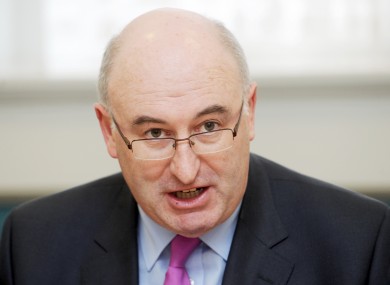New hotline number 116000 for missing children in Ireland


Runaway teenagers and those thinking of fleeing home will be giving emotional support on a new hotline for missing children.
The parents, siblings or carers of missing children can also get advice and guidance on the 116000 number, which will be run by the ISPCC.
 Children’s Minister Frances Fitzgerald said the service will provide an important support for children missing from home and for their families.
Children’s Minister Frances Fitzgerald said the service will provide an important support for children missing from home and for their families.
“We must acknowledge that for those children who are missing and even for those who may be considered missing only for one day, there is a family member or significant other who is worried, frightened and distressed and that there is a child out there feeling scared and alone because they are either in danger or have left their home,” she said.
“The 116000 hotline is now available as an extra resource to these families and children. It will help provide the emotional support and information needed during such a difficult time.”
Cases can include a child running away, parental abduction, criminal abduction, asylum children vanishing, or even a child getting lost.
Under EU telecoms rules, the 116000 number is reserved in all EU member states for a missing children hotline.
The Irish number, which has been operating on a pilot basis since December, will be financially supported by the Department of Children and Youth Affairs and the EU. But parents are warned that initial calls should still be made directly to gardai who, in emergency cases, can trigger its Child Rescue Ireland (CRI) Alert if they believe a child has been abducted and that there is an immediate and serious risk to his or her health or welfare.
ISPCC chief executive Ashley Balbirnie said a child going missing is a parent’s worst nightmare.
“The ISPCC is delighted that after several years of advocating for this vital service, we are finally able to provide support to children and families on a 24 hour basis,” he added.
Water leaks to be fixed for free in water bills plan


Coalition bids to soften blow as home owners face €300 charge
Homeowners hit with enormous water bills because of leaks will have the repairs paid for by the Government.
A ‘first-leak’ policy is being developed whereby repairs will be carried out on private properties with a problem once charges are introduced,
It had been expected that homeowners would have to pay for any repairs on their properties from their own pockets.
But the first-leak policy is aimed at softening the blow for the public, who will be hit with annual water bills – likely to average €300 – from late next year or early 2015.
The scheme, set to be part of the meter installation process, will cover the cost of repairing pipes between the footpath and hall door.
It will not cover internal leaks, and detailed arrangements on how the scheme will operate are being worked out with Irish Water, which will take control of the entire network on a phased basis between now and 2016.
The Department of the Environment last night confirmed that the policy was being drafted in consultation with Irish Water. “We are working on a proposal on customer side leakage,” a spokesman said.
“Minister (Phil) Hogan’s objective, as part of a range of conservation measures to be put in place, was that where leakage is found through the water meter installation programme on the customer side, a first fix free or equivalent scheme will be provided.”
Experts said the cost of fixing and replacing these pipes ranged from €800 to €1,200 per property. This means the bill to complete repairs could be as high as €60m.
Similar schemes are in place across the UK. Anglia Water pays for pipe repairs, but only for people on social welfare.
The policy being developed here will apply to all homeowners regardless of their income, but any subsequent leaks will have to be repaired by the customer.
One source said the move would help drive home the message that water was expensive to produce and should be conserved.
It comes after studies in Galway and Dublin found that as many as one in 20 homes in the State could have a leak.
One Galway property was drawing 61,000 litres of water a day from the public mains – the amount normally used by 420 people.
The State spends €1.2bn a year on water services, including building new treatment plants, replacing old pipes, disposing of wastewater and treating ‘raw’ water so it is fit for human consumption.
“Much of the water infrastructure is not good quality, it’s not fit for purpose at all,” one source said.
“There’s been a lot of bad building where pipes aren’t buried deep enough, and something like this is critical. It tells people there’s no threat to them financially until it’s solved, and the other advantage is if it’s a big leak, by fixing it we save water.
“You’ve got to bring people with you when they’re paying to protect the resource. Fixing the leaks is part of it. It will take time to do this, but this is the only way.”
ASSESSED
Water meters will be installed in just over one million homes over the next three years, with work beginning next month.
Charges are expected to be introduced at the end of next year or in early 2015.
Up to 300,000 homeowners – primarily people living in apartments which cannot be metered – will pay their bills based on average consumption, called an “assessed charge”.
Some homes will also pay an assessed charge until meters are installed. It is understood that people who use less than the average amount of water will be given a refund or credit against future bills.
The first-leak policy could benefit thousands of homes.
Based on leak detection rates in Dublin, 50,000 homes throughout the country could have a leak in the pipe running from the water mains into the property.
Among the options being considered to fund the repairs are asking Irish Water to complete the work, or introducing a grants scheme where local contractors could be hired, boosting employment.
The Commission for Energy Regulation (CER), which will set the tariffs, could also be asked to factor in the repair bill when determining the charges to be levied on homeowners.
Another option is funding the works directly under the Water Services Investment Programme, which is administered by the Department of the Environment.
Junior environment minister Fergus O’Dowd told the Engineers Ireland annual conference in Dublin yesterday that selling the message to the public about water metering and the importance of conservation was the biggest task facing Irish Water.
Up to 60pc of water was wasted in Co Roscommon through leakage, he said.
It was “critical” that Irish Water was accountable to the public and to the Oireachtas, and did not become like an “HSE on wheels”, he added.
A takeover deal agreed at Sunday Business Post newspaper

It is understood staff at the Sunday Business Post are to be offered 6% of the company under the deal
The Sunday Business Post is to be bought by Irish investment company Key Capital and Paul Cooke (above) a former executive with the Star.
The takeover is subject to the agreement of creditors, however it is unlikely that there will be any objection.
Key Capital is a capital markets and corporate finance business headed by Conor Killeen. It has offices in Dublin and London.
The Sunday Business Post has been in examinership following a restructuring of Thomas Crosbie Holdings, which owned newspapers including the Irish Examiner.
It is understood staff at the Sunday Business Post are to be offered 6% of the company under the deal.
They have also been asked to sign a letter confirming that they would only be entitled to statutory redundancy if they are made redundant. This would affect the terms of earlier redundancies offered to staff.
The company currently employs in the region of 74 staff.
It is understood it is being bought for €750,000 with a commitment to a further €250,000 investment.
6 Lifestyle habits to protect your health and Prevent Heart Disease


Heart disease has to do more with blood pressure and cholesterol; if you can devise plans to control these conditions, you are less likely to develop this ailment. It is true that, despite age, heredity and sex being uncontrollable heart risk factors, you can easily prevent heart disease to a considerable extent by cultivating certain healthy lifestyle habits.
However, looking at the way the number of deaths increasing due to heart ailment, it looks like somewhere down the line, we are not taking utmost care of ourselves. This is where we need to get serious since a healthy heart is a sign of happening life.
Following are certain heart disease prevention measures that you must incorporate to stay fit and live longer.
 Better Stay Away from Smoking
Better Stay Away from Smoking
Considered one of the leading causes of heart disease, smoking plays a significant role in enhancing your risk of developing heart disease. There is a misconception among most people that smoking less will not affect their heart much. This holds no truth where even experts believe that smoking – less or more in the long run – continues to produce negative effects on your lungs and heart. Whether it is exposure to second hand smoke, or smoking low-nicotine cigarettes, all are equally harmful.
The nicotine content of cigarettes acts on your heart, forcing it to work vigorously by narrowing your blood vessels, which eventually increases your blood pressure and heart rate. Carbon monoxide – that you take in while smoking – interferes with the oxygen supply in the blood, again adding to your chances of developing heart disease. Smoking creates the same negative effects in women, as well. Their susceptibility to heart disease can increase a lot with smoking, or if they take birth control pills. As the age advances, so does this risk – especially in women above 35.
If you quit smoking, it will not only reduce your risk of heart disease but also help in keeping you away from other dreadful diseases. Any day, a person who does not smoke lives well and stay fit for a long time.
DASH diet is what experts recommend for protecting your heart. It emphasizes eating foods that are low in salt, fat and cholesterol. Foods that should cover a majority of your diet include fruits, vegetables, whole grains and low-fat dairy products. Apart from this, foods rich in low-fat protein and omega-3 fatty acids – fish, flaxseed, soy, lean chicken, beans, egg white, canola, walnut oil – are good for your heart.
Also, make sure that you avoid excess intake of saturated fat and Trans fat since they help raise your blood cholesterol levels, adding to the risk of coronary heart disease. Red meat, high-fat dairy products, deep-fried fast foods, etc. are the foods to avoid. Even, with your alcohol consumption, make sure that you do not cross the number of drinks more than – two drinks a day for men and one in case of women. Alcohol does produce a positive impact on your heart, which may turn hazardous with excess intake.
 Spare at least 30 Minutes for Exercise
Spare at least 30 Minutes for Exercise
Maintaining an active lifestyle has always been of paramount importance for staying fit and addressing heart-related concerns. You come across positive changes in your health when you get some regular exercise and work towards maintaining a healthy weight. This protects you from developing conditions such as high cholesterol, high blood pressure and diabetes, which multiply your vulnerability to heart disease. It also stimulates your body to release endorphins and serotonin in excess, which enhances your mood and boosts confidence. This improves your stress-coping ability, which is necessary for a healthy heart.
Make sure that you get at least 30 minutes of exercise regularly. However, if your hectic routine is getting in the way of your exercise routine, indulge in 10-minute workout sessions many times a day at your convenience, or workout at least for the most part of the week. It is not that physical activity implies working out on a stretch; action is vital whether it is in relation to any activity like gardening, cycling; or healthy habits like taking stairs, walking instead of driving, etc. The key is to stay active and enjoy the activities.
 Control your Weight
Control your Weight
Obesity brings with it dreadful conditions like hypertension and diabetes, which elevates the risk of heart disease. This is where you need to get careful. Make sure that you follow a healthy lifestyle and eat a healthy diet consistently. Of course, the temptation to munch on chips or any of your favorite food will come up; control it, that’s it. Eating them once in a while is all right, but do not make it habitual.
 Live Stress-Free
Live Stress-Free
Anxiety, depression, and loneliness are three things that arise with stress every time. However, it is not that you cannot manage stress. Stress can play a vital role in harming your heart where it may cause nausea, palpitation, breathlessness and fast heart rate. The easiest way to handle stress is to stay calm and positive. Socializing and involving in your hobbies also help get you out of stress.
 Do not Skip Regular Medical Checkups
Do not Skip Regular Medical Checkups
Only a regular medical checkup can lead to the detection of the symptoms of heart disease at an early stage. This is quite crucial since it allows you to get proper treatment and take proper care of your heart. A person mostly suffers from diabetes, hypertension after crossing 40 years of age. If you are suffering from any of these conditions, it is a must for you to make a visit for regular medical checkup.
Thus, these are certain lifestyle habits that you should incorporate for your heart health. The main thing is to avoid leading a sedentary lifestyle. Activity and healthy diet are two things to emphasize. Make sure you take care of it consistently.
Ancient Irish texts show volcanic link to cold weather
Annals written at the monastery at Clonmacnoise recorded significant events including extreme weather
Researchers have been able to trace the impact of volcanic eruptions on the climate over a 1200 year period by assessing ancient Irish texts.
The international team compared entries in these medieval annals with ice core data indicating volcanic eruptions.
Of 38 volcanic events, 37 were associated with directly observed cold weather extremes recorded in the chronicles.
When the weather that is cold enough to allow you to walk over a lake in Ireland, it is pretty unusual”
In the dim light of the Dark Ages, the Irish literary tradition stands out like a beacon.
At monastic centres across the island, scribes recorded significant events such as feast days, obituaries and descriptions of extreme cold and heat.
These chronicles are generally known as the Irish Annals and in this report, scientists and historians have looked at 40,000 entries in the texts dating from AD431 to 1649.
The researchers also looked at the Greenland Ice Sheet Project (GISP2) ice-core data.
When volcanoes erupt, they produce sulphate aerosol particles which down the centuries have been deposited on and frozen in ice sheets, leaving an extremely accurate temporal record of the event.
Walking on water
Scientists say these particles reflect incoming sunlight and can cause a temporary cooling of the Earth’s surface. In a country with a mild maritime climate like Ireland, these colder events would have a significant impact.
The Hekla volcano in Iceland had a major eruption in AD1104. This clearly registers in significantly elevated sulphate levels in the Greenland ice at the time, and is reported in the Annals of Inisfallen as: “Heavy snow this year, and a great loss of cows, sheep and pigs in the same year.” And then again in AD1107, it is reported that “Snow fell for a day and a night on the Wednesday before the feast of St Patrick, and inflicted slaughter on beasts in Ireland.”
“When the weather that is cold enough to allow you to walk over a lake in Ireland, it is pretty unusual,” lead author Dr Francis Ludlow, from Harvard University, told BBC News.
“When it happened, it was remarkable enough to be recorded pretty consistently.”
The scientists in the team identified 48 volcanic eruptions in the time period spanning 1,219 years. Of these, 38 were associated closely in time with extreme weather events identified in the Irish texts.
“These eruptions occur and they override existing climate patterns for a period of two or three years,” said Dr Ludlow.
“And it is clear from the sources that they cause a lot of devastation among societies at the time – whether it was the mass mortality of domestic animals or humans, or indirectly by causing harvest failure.”
The end is nigh
The research team believe the texts are accurate as the annals also record solar and lunar eclipses which can be compared with other contemporary sources.
The keen recording of weather though had another motivation.
“A lot of these scribes are working in monasteries, in some time periods they are interpreting these weather events as divine omens or portents as signals of the coming of the last days,” said Dr Ludlow.
“That was one of their motivations so we are able to use the records that were created for a completely different purpose that the scribes would never have conceived.”
The researchers say that one expected effect of volcanic eruptions that occur in tropical regions is to make for milder winters in northern latitudes.
But in this study, they found several instances of these type of eruptions causing extremely cold winters in Ireland. The team believes their work shows the complex nature of volcanic impacts on climate, and they say there are lessons for the future in the ancient texts.
“That tells us a lot about what sort of weather we might expect in the British Isles when the next big eruption goes off,” said Dr Ludlow.


No comments:
Post a Comment